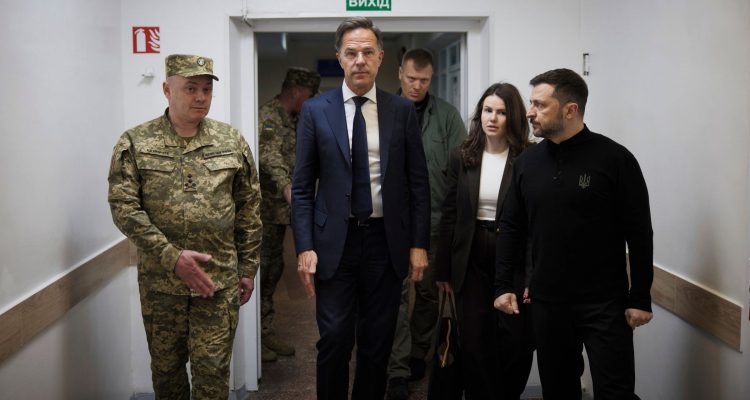Updates on the U.S. and Iran, a profile of the man who wants to save NATO, and more
NATO Secretary-General Mark Rutte keeps a variety of mementos in his office. There is a sprawling photograph of the North Sea from the vantage point of his hometown in the Netherlands, a kanji gift from Japan’s Minister of Defense, and a framed floral embroidery that reads “In Unity is Strength” in Cyrillic with the stitched flags of NATO, Ukraine, and the E.U. But the room’s largest ornamental feature is the blue-and-white map of the world that looms above his conference desk. “In the past, I was responsible for this,” theformer Dutch Prime Ministersays, pointing to his tiny home country in the northwestern corner of Europe. He extends his arms out to encircle the entire Western defense alliance that is home to 1 billion people. “And now …” he says, with a wry laugh.
It’s a glimpse of the storms roiling beneath the optimism of the preternaturally cheerful Rutte. We are in the steel and glass NATO HQ on the outskirts of Brussels,completed eight years agoat a cost of $1.3 billion, its interlocking buildings meant to evoke fingers clasped together in unity. But on this balmy May afternoon, five weeks before a critical summit with the mercurialU.S. President Donald Trumpand dozens of other leaders, the question of unity hangs over the alliance. “It is really a pivotal moment,” Rutte says, after we sit down in his office, some six short months after he became Secretary-General in October.
“Pivotal” may be an understatement. Trump has repeatedly said,most recently in March, that he’s “not going to defend” NATO allies that don’t spend enough on their militaries, athreatto the mutual defense commitment at the heart of the alliance. Europeans, awakened to the danger of American inconstancy, are scrambling to spendtrillions moreon defense in coming years. All the while, Russia’s assault on Ukraine grows deadlier by the month, andintelligencefrom theBaltic states,Denmark, andGermanysuggests Moscow could rebuild its armed forces and attack NATO members Estonia, Latvia, or Lithuania within a few years.
Rutte, 58, brings an idiosyncratic mix of experience and personality to the job of saving the alliance. An amateur concert pianist and part-time high school social-studies teacher, the center-right politician was the longest-serving Dutch Prime Minister in history. In that role, he developed a talent for working with people from across the political spectrum in the Netherlands, Europe, and the U.S. He even gained a reputation as something of a Trump whisperer.
Rutte has used those skills while shuttling between European capitals and Washington, D.C., to push for a newdefense-spending target of 5% of GDPfor NATO members. The goal,set bythe Trump Administration, is a stretch: about a quarter of the allies last year failed to reach the current target of 2%.
Lurking behind the numbers are hard questions about what European and Canadian allies are capable of on the battlefield. For decades, NATO has depended on the U.S. for mobile land forces, air defense, long-range weapons systems, and the biggest security shield of all—the nuclear “umbrella” over the continent. “[NATO] doesn’t work without the nuclear umbrella and all the strategic leadership and strategic force capabilities that the U.S. brings,” says General Gordon B. Davis Jr. (ret.), a senior fellow at the Center for European Policy Analysis and former top NATO official.
The position of Secretary-General is mainly a diplomatic one, with no direct military authority. But Rutte, a workaholic bachelor with no photos of loved ones in his office, seems to bemarshaling member statesto meet the moment. His most immediate task is ensuring allies rally around the spending push during the June 24–25 NATO summit in his hometown of the Hague, and in that he is optimistic. “I’m really pretty confident that it will be a splash,” Rutte says. “I see Europeans stepping up.”
And after that? In its first half century, NATO preserved democracy in postwar Europe, helped defeat the Soviet Union, and served as a synonym for “the West.” Once Rutte finishes sorting out the books, there awaits the challenge of making sure the alliance remains united and durable for the years to come.
Rutte has trainedhis eyes on the spending target ever since Trumpfirst floated it in January. He is keeping up the push in the weeks before the summit. Two days after his TIME interview, Rutte strolls up to a black Mercedes, arm extended, to greet Czech President Petr Pavel as he steps out of the vehicle, brown leather bag in hand. “Welcome back,” Rutte smiles, guiding the stoic Pavel, a retired army general and former chairman of the NATO Military Committee, toward the headquarters building. The two men sit down for a closed-door meeting, and afterward, Pavel is direct about his nation’s spending commitment. “If the discussion in the Hague leads us to a general agreement that we need to spend up to 5%, Czech Republic is ready to support it,” he says at the closing press conference.
Others are less forthcoming. A couple of hours after Pavel’s positive comments, Rutte greets a beaming Dutch Prime Minister Dick Schoof elsewhere in the building with a hug and launches into talks. At the press conference that caps his visit, Schoof is evasive when asked if the Dutch will agree to the 5% goal. “We will discuss intensively in the Cabinet and the parliament probably as well on what we are going to do.” The Netherlandsagreed to the targeton June 13.
Getting Europe to pay up may be the most important step in preventing the transactional Trump from undermining the alliance, but managing him requires its own skills. Rutte has repeatedly said that the Trump Administration is “absolutely right” in making more demands of the alliance, and that tone has played well in Washington.
“It’s great to be with a friend of mine,” Trumpsaidat their last meeting in the Oval Office in March. “Every report I’ve gotten is ‘What a great job he did,’ and I’m not at all surprised.” Rutte’s approach also seems to be yielding tangible results. Trump had reportedly threatened to skip the NATO summit, but the White Houseconfirmedon June 3 that he will attend.
The spending push is not just about addressing Trump’s complaints that the allies aren’t paying their fair share for defense. “This is about practical stuff,” Rutte says. “We know that on the Canadian and European side we lack air-defense systems, we lack long-range missiles, we lack logistics systems, maneuverable land formations.”
Increased European capability would free America up to focus more on China. “The [U.S.] defense budget is continually under pressure. We have real readiness issues after many years of deployment,” says Rachel Ellehuus, a former adviser to the U.S. NATO mission. “The U.S. is facing its own pressures and really needs allies to step up.”
No matter how quickly they do, few think America’s NATO allies could stand up to a direct Russian threat without the U.S. Which means all of Rutte’s efforts on the budget and capabilities fronts would be for naught if Trump simply decided not to come to the defense of alliance members, should the worst come to pass.
There’s reason to worry it might. Russian sabotage against U.S. and European targets tripled from 2023 to 2024, according to aCenter for Strategic and International Studies report. The head of Germany’s intelligence has even warned that sabotage could trigger Article 5, NATO’s mutual-defense clause. So could a Russian attempt to seize land in former Soviet republics where Russian-speaking minorities are numerous.
All of which adds urgency to the cheery Netherlander holding the reins.
War and tragedyhave loomed over Rutte’s life. His father Izaak, a trader who spent much of his life in Indonesia, then a Dutch colony, survived the Tjideng Japanese labor camp. His wife Petronella did not, and Izaak married her sister Mieke. They would live in the country until the 1950s.
Rutte was born in the Hague in 1967, the youngest of seven children from his father’s two marriages; some siblings are decades older. One brother died from AIDS in the 1980s, an event heonce said“drastically” changed his worldview. “I realized that I will only live once. There is no dress rehearsal, there is only one performance,” Rutte said. “That is where my enormous drive comes from.”
Rutte showed an early interest in politics. He joined the youth branch of the center-right People’s Party for Freedom and Democracy (VVD) at 16. Although his ambition was to be a concert pianist, he chose to pursue a degree in Dutch history at Leiden University instead. Rutte calls the piano his “great hobby” but is careful not to play past 9 p.m. because of neighbors living on six sides. “Then you get calls, ‘Our children are trying to sleep. And by the way, it was not as good as you thought,’” he laughs.
Rutte rose up the VVD’s ranks, becoming national chairman of its youth branch while a student at Leiden. He graduated in 1992 and held a series of human-resources jobs at Unilever before taking office as a member of parliament in 2003. Rutte won the VVD leadership position in 2006, and in the 2010 elections led the party to become the largest in parliament for the first time ever.
Soon after, he became Prime Minister, proving himself to be a master coalition builder. Rutte’s first government was a coalition with the more right-leaning Christian Democrats (CDA) but waspropped upby the far-right Party for Freedom (PVV), led by the anti-Muslim firebrand Geert Wilders. His second, third, and final Cabinets included a mix of social democrats, centrists, and conservatives. He is “a very capable politician who is able to bring people together even when they have very different views,” says Simon Otjes, a senior assistant professor at Leiden University.
Rutte has also been dogged by scandal. His third Cabinetresigned in January 2021following a parliamentary report that found that as many as 10,000 families were forced to repay thousands of euros after they had been wrongly accused of welfare fraud. Anotherparliamentary report in February 2023found the Dutch government had for years ignored the risks of drilling gas in Groningen, which had caused man-made earthquakes that damaged homes and affected thousands of lives. Rutte apologized for both scandals. Throughout various controversies, Rutte had a habit of stating he had “no active memory” of thornier details. “He had a more flexible relationship with the truth,” Otjes says.
The end came in July 2023 when heresigned over a migration fight. But even as his political career waned, the next February hesecured a critical endorsementfrom the U.S. for the top NATO job. The Biden Administration considered other candidates, including the more hawkish Kaja Kallas, then Prime Minister of Estonia. But “President Biden had liked him,” recalls Sean Savett, the former White House National Security Council spokesperson, and Biden and his advisers concluded that Kallas was “less likely to be able to win over support from some of the Western European allies.”
Those who know Rutte well expected the job would be a big lifestyle shift for him. He had spent years going to the same hairdresser, visiting the same cafés, and eating the same meals at the same restaurants in the Hague. “He sometimes drives his closest friends crazy, because of all these habits,” says Sierk Nawijn, a special adviser to NATO who has worked with Rutte for a decade.
Rutte has also kept the same modest apartment in the Hague that he bought with his best friend in his youth. He later shared it with that friend’s mother for 20 years until she passed away in 2012 while Rutte was Prime Minister. Rutte still gets back to the Hague whenever work permits—perhaps in part because of the routines that help keep him grounded. Those include teaching a high school social-studies class on Fridays at the Johan de Witt group of schools. “I love doing it,” Rutte says. “It gives you so much energy.”
The downing of MH17 over Ukraine’s Donbas region,byRussian-backed forcesin July 2014, may have provided the most formative experience to the future NATO Secretary-General. The attack claimed 298 lives, 196 of them Dutch. Rutte says that “all illusions” he may have had about Vladimir Putin were “gone” after it took six nights of calls for the Russian President to agree to help families retrieve the remains of loved ones. “And then after that he never, ever, ever was able to accept that the Russians probably made a mistake,” a still visibly shaken Rutte says. “It has to do with basic decency.”
The tragedy of Ukrainehas stayed with Rutte ever since. He became one of the most frequent wartime visitors to the country andmade his first trip as Secretary-Generalthere on Oct. 3, just two days after taking up the NATO post, meeting Volodymyr Zelensky in Kyiv. In April hevisited Odesa, a city the Ukrainian President has avoided taking world leaders to since last March when a Russian ballistic missile struck within hundreds of meters ofGreek Prime Minister Kyriakos Mitsotakis. When asked why he was willing to take the risk of traveling there, he says it was “just to make the point that it is not only Kyiv which is under threat.”
Rutte now helps coordinate outside security assistance to Ukraine, anew responsibilitygiven to NATO by the Biden Administration in an attempt to Trump-proof aid. European and Canadian NATO allies have so far this year given more than the estimated $20 billion the U.S. provided in 2024. A German military officer involved in providing support to Ukrainetold Reutersthat, if necessary, Europe can sustain Ukrainian resistance alone.
But the war in Ukraine has also underscored the limits of Rutte’s power. Almost a year ago, NATO membersagreed to an “irreversible path”for Ukraine to join the alliance. Rutte finds himself in the middle. On the one hand, he says the deal with Kyiv is “still standing,” but he adds, to the disappointment of Ukrainian officials, that it “doesn’t mean that membership is part of a peace deal.”
That’s another delicate issue. Rutte has publicly backed the peace talks that grew out of Trump’s view of himself as a dealmaker, and have at times raised alarm among others in NATO. The “Trump Administration’s approach has been to put pressure on the victim, Ukraine, rather than on the aggressor, Russia,” the U.S. Ambassador to Ukraine Bridget Brinksaid in Aprilbefore resigning. Rutte says that the U.S. President is “doing exactly what he needs to do. I really commend him for that. Because he broke the deadlock and is constantly engaging with Ukraine and Russia.”
Rutte brushed off current concerns that Trump is abandoning his cease-fire efforts at the press conference with Schoof. An agreement must ensure that Putin never again tries to “capture one square kilometer, square mile of Ukraine. That is crucial.” But the conflict has only escalated, with Russia’slaunchingsome of itsmost extensivestrikes in a war that has claimedhundreds of thousands of casualties, and Ukraine’s carrying out the audaciousOperation Spiderwebdrone attack, which damaged or destroyed strategic aircraft inside Russia. The prospect of a cease-fire looks more elusive than ever.
NATO, of course, was created to deter an attack by Russia, when it was doing business as the Soviet Union. And the U.S. was a key architect of the alliance, and the world order Trump is intent on dismantling. So there are easier jobs than the one Rutte holds. And even critics give Rutte high marks for handling Trump and rallying European allies to boost spending and military readiness. The abbreviated NATO summit—reportedly scaled backto keep Trump happy—should be a point of celebration for both men, assuming the funding boost is agreed to as hoped. But the next challenge will be executing those plans. “He’s got big, big work to do,” General Davis says, and “there are surprises to come.”
It helps that he’s upbeat. Back at Rutte’s office, as our interview begins to wind down, the Secretary-General repeats afamiliar lineabout the alliance’s ability to outpace Moscow—if it chooses to. “The Russian economy is only 5% of the NATO economy. They are $2 trillion. NATO is $50 trillion. And they produce four times as much ammunition as the whole of NATO.”
Three-quarters of a century after its founding, Rutte is confident that NATO can fend off any threat from Moscow. “I am pretty much convinced that we are safe for now,” he says. But Russia is reconstituting its armed forces, and Rutte warns of the risk of being complacent. “If we do not invest much more, plus get the defense industrial production going,” he says, “the Russians might try something.”
Optimism, after all, will get you only so far.







